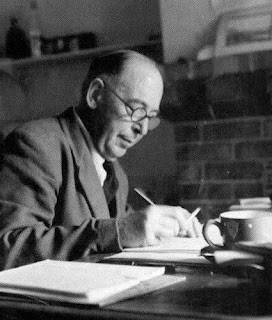Today is the 47th anniversary of C.S. Lewis’ death, and therefore his unofficial “feast day”. Lewis was instrumental in my conversion to Catholicism and remains one of my literary and spiritual heroes. His Chronicles of Narnia baptized my imagination while his books on Christianity deeply influenced the ways I understand God and the spiritual life.
Though I don’t have the statistics, it’s probably safe to say that Lewis was the most popular Christian author of the twentieth century. His appeal extends across all Christian traditions, from Evangelical Protestants to Catholics, from Pentecostals and Baptists to Anglicans.
Despite the fact that Lewis himself remained an Anglican his whole life, many Catholics have pointed to Lewis as instrumental in their journey to the Catholic Church. Lewis embraced many traditionally Catholic doctrines–the Real Presence of the Eucharist, the existence of purgatory, the communion of Saints, the value of the liturgy, the need for confession, and the need for objective church authority among others–yet he never crossed the Tiber himself. Many biographers have chalked this up to Lewis’ Ulster Protestant upbringing in an anti-Catholic Irish region, while also noting the social difficulties that would have accompanied a possible conversion.
(Joseph Pearce has an in-depth book on this subject titled C.S. Lewis and the Catholic Church.)
Regardless, Lewis has become a sort of “Catholic Moses”, leading scores of others into the arms of the Catholic Church while never entering it himself. As I read more and more about C.S. Lewis the man–or “Jack”, as he was know to friends and family–I see in his life the same saintliness that exudes from his writings. His personal letters carried the pastoral care of a lifelong priest, while stores about his daily interactions reveal someone whose theology saturated his whole life, not just the academic and literary realms.
Though he will never be canonized a Saint in the Catholic Church, to me Lewis is a clear saint. The simplest definition of a saint is “one who is close to God”. Lewis understood this as well as anyone, and whether it be through Aslan, Screwtape’s “Enemy”, or the Jesus of Scripture, Lewis’ always moved “further up and further in” to the center of the Divine.
(Also, interesting fact about this day in history: Lewis died in his home at 5:30pm (GMT) on November 22, 1963. Two hours later, President John Kennedy was assasinated in Dallas, TX at 1:21pm (CST). Exactly six hours later, at 5:21pm (PST), Aldous Huxley, author of “Brave New World”, died in Los Angeles, CA. That has to mean something….)
Update: Not to be disappointed, I discovered that the illustrious Dr. Peter Kreeft wrote a fictional dialogue shared among these three very men shortly after each of their deaths: Between Heaven and Hell.

